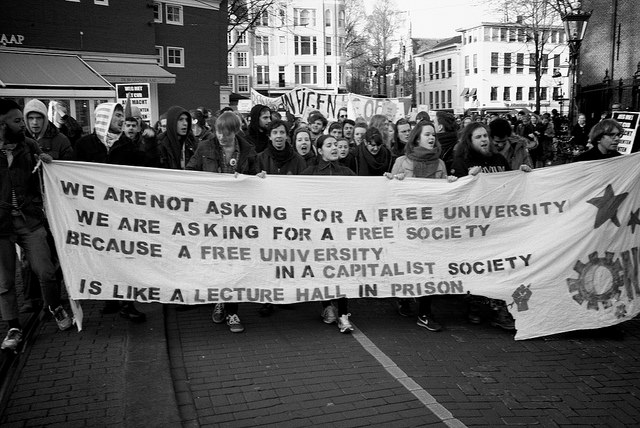
In Washington, DC, the George Washington University (GWU) fired more than half of the faculty at the Corcoran School of the Arts and Design. The decision came roughly one year after the acquisition of the Corcoran School by GWU. One professor, Antje Kharachi, whose contract was terminated, said, “The past few years have been absolutely exhausting. As much as I loved the Corcoran, I feel relief that the seemingly endless wait is finally over. We’ve been lied to, undermined, disrespected, while trying to hold the [Corcoran School] together for our students.” Kharachi was just informed her contract would be terminated, and she felt relief. This comes on the heels of the firings of two of the University’s Women’s Studies Program’s most widely known adjunct faculty in an effort to “restructure” the program at GWU. Two months prior to the Corcoran layoffs, GWU announced they would also be restructuring their dining program. The over forty workers, many of whom have spent anywhere from one to five decades working in some capacity with the dining program, have recently lost the permanence of the space they have made their livelihoods for decades. Both faculty and dining workers had heard only vague reports of their future employment at the University, and spent years reporting to work under the presumption that any day could be the day their jobs were lost.
“All right, Chesimard, pack your things. You’re being moved.”
“Moved? Where?”
“You’ll find out when you get there.”
“Then i’d like to call my lawyer.”
“You can call your lawyer when you get where you’re going.”
In Assata: An Autobiography, Assata Shakur describes the physical space of her incarceration in and around the Middlesex County Jail: “My abrupt transfer form one jail to another, without either notice to my lawyers or explanation to me, was a scenario that would be repeated over and over again during the next few years.” We often envision and discuss the space of incarceration as one of stagnant permanence. For Assata Shakur, and many others, along with solid cell walls and the indefinite permanence of solitary confinement, space also involved abrupt relocations without warning. It dictated and severely limited her relationships with her lawyers, friends and family. According to a Department of Justice report, nearly every state’s Department of Corrections “does or can transfer inmates to destinations in other states.” In Washington D.C. alone, one in five people incarcerated on felony charges is imprisoned more than 500 miles from the District of Columbia.
In relation to global militarization and securitization, violence and displacement, or “expulsion”, the impermanence of space operates as psychological warfare from individuals, such as Assata Shakur, to entire local communities to millions of people. These displacements benefit the systems of expulsion by expelling people from both land and sense of self. People are forced out of their sense of permanence and community. Landless, homeless, and without anchor, people experience loss of community as a kind of radical individuality that is not conducive to pushing back against the forces that lead to Assata’s incarceration, the ambiguity of future employment in campus dining, or displacements on a massive scale.
At GWU, the fear and unknowing about whether or not one’s job would continue to exist instilled in many a sense of despair. Lack of communication and vague non-promises about what comes next produces a demoralization that keeps workers in a state of anxiety, a state of heightened individuality that creates an even more challenging environment for collective organizing. These decisions are not specific to the George Washington University alone, but rather emblematic of a broader trend in higher education, and in the global economy as a whole. The precariousness of work has come to play a central role in efforts to financially, psychologically, and emotionally control huge swaths of people. To understand both the permanence and impermanance of space is to better understand the precariousness of work. The structuring of this new impermanent work environment leaves many with hyper-individualistic sense of despair – kept in the dark about their own time and futures, and left feeling powerless.
Workers in the struggle to put an end to on-call scheduling and reclaim some permanence in their work lives; students, workers, staff, and faculty at universities demanding accountability and transparency for administrator’s decisions to cut budgets and restructure programs; communities organizing to be informed about rights and resistance in the face of raids that fill the beds of immigrant detention centers globally are already challenging the impermanence of space. It’s time to demand full transparency and accountability from administrators as they dangle workers’ futures over a ledge, it’s time to end the practice of prisoner relocations beyond the reach of their families and loved ones. When we challenge the logics and practices that leave us feeling powerless and alone, we win. These systems are allowed to thrive when the individual is adrift amongst a sea of individuals, and to assert that a radical collectivity is not only ideal, but also necessary.
(Photo Credit: Guido van Nispen / Truthout)